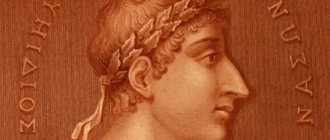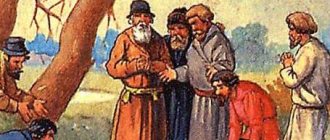Ovid Naso Publius short biography (43 BC - 18 AD)
Ovid quotes. Naso Publius Ovid briefly. Roman poet. Born into a family that belonged to the wealthy equestrian class, he received the usual rhetorical education of that time. He was brought up during the era of the Augustan Empire, when, after the end of the civil wars and the establishment of the primacy of Italy over the provinces, the welfare of the Italian landowning and trading population increased enormously. Ovid was a poet of the secular life of Rome in the Augustan century, reflecting in his work the ideology of the trading and usurious class (equestrianism), which at that time had reached a high degree of economic development.
Ovid's work
Social and philosophical issues are alien to Ovid, which is also characteristic of the previous literary generation that survived the collapse of the Republic (Virgil, Horace); erotic themes decisively predominate in his work, with an emphasis not on the depth or immediacy of experience, but on a witty and effective ironic play with traditional literary motifs. Ovid's works are distinguished by virtuoso lightness and flexibility of verse, which he mastered to perfection. In his literary style, the merchant-usurious class was outliving the period of its youth, moving from the era of growth to the era of maturity.
Cultivating individualistic poetry, Ovid in his early poems “The Science of Love” and “Remedies for Love” gives instructions in the field of love relationships and introduces scenes from Roman life. The transition to large works in the spirit of Hellenistic “scientific” poetry was marked by the creation of Ovid’s poem “Metamorphoses,” which was conceived as an epic and contains about 250 mythological and folklore tales about the transformation of people into animals, plants, constellations, and even stones. In the last period of his life, “Mournful Elegies” and “Pontic Epistles” were written.
At the end of 8 AD. e. Ovid was exiled by Augustus to the city of Tomy (now the port of Constanta in Romania), where he died. Ovid was highly regarded by A.S. Pushkin, interest in the exiled poet was reflected in the poem “In the country where he was married to Julia,” “To Ovid,” and in the poem “Gypsies.”
About hairstyle, jewelry and choice of colors
Practical advice.
“Keep an eye on your hair - here, one touch of the hand decides! - And don’t forget that not everything and not everyone looks the same: Choose what suits you, look in the mirror, check.
Long faces have a straight parting: Laodamia’s hair lay unadorned like this. Hair in a small bun over the forehead and open ears - This hairstyle will suit a round face.
You can spread your distant curls over both shoulders, as Phoebus scattered them when he took the melodious lyre; You can tie them in a knot at the back of your head, like the maiden Diana, who, girded with her tunic, drives away the forest animals;
A high bouffant suits this one, the more voluminous the better, That one will lay the strands more tightly, hair to hair; Killena's tortoiseshell comb would be good for this one, and Toy's would be a wide stream of free wavy hair. ... And for others, negligence is good; so that you comb your hair in the morning today - but let it seem like yesterday!”
About how excessive decoration scares off men and about the need to choose colors to match your appearance.
“So do not put precious stones in your ears, Those that the Indian finds black in green water; Do not embroider clothes with heavy golden seams - Such luxury will not attract men, but will frighten them away.
No, beauty is sweeter than simplicity. Having driven away the sleepy winter, blooming with every vine, There are so many and more colors on women’s clothes, Just be able to recognize what suits someone best. White skin - black fabric: this is Briseis - ... Dark skin - white fabric: ..."
* * *
Plutarch, at the beginning of the life of Pericles, tells the following anecdote: “They say that once Caesar saw in Rome how some rich foreigners carried puppies and small monkeys in their bosoms and caressed them. He asked them if their women would not give birth to children? With these words, quite worthy of a ruler, he gave instructions to those who waste our natural need for love and tenderness on animals, whereas it should belong to people.” Ovid noted such love and tenderness - but made the addressee mythological monsters: Jason strokes the chests of fire-breathing bulls, Medea strokes the necks of dragons harnessed to a chariot.
Personal life
From the works of Ovid it becomes known that he was married three times.
The lyricist's first wife, whom he married at the insistence of his father, was supposed to protect him from frivolity and a frivolous life. However, the wife's efforts were in vain. The guy continued to lead an idle life, having several mistresses.
As a result, the wife decided to leave Ovid soon after marriage. After this, the lyricist entered into marriage of his own free will. However, this union did not last long.
For the third time, Ovid married a girl named Fabia, whom he loved very much and looked for inspiration in her. For her sake, the man stopped leading a wild life, spending all his time with his wife.
It is worth noting that Fabia had a daughter from a previous marriage. Ovid did not have his own children.
The love idyll was interrupted by the poet’s exile to Tomis, where he found himself completely alone. Biographers suggest that Fabia was somehow connected with an influential patrician family, thanks to which she could support her husband in exile.
About gait, posture, laughter and correspondence
Of course, he makes comparisons...
“Do not open your mouth to its full width, let your teeth be covered with your lips, and let your cheek form a dimple. Do not endlessly shake your womb with strained laughter - Laughter should also sound feminine and frivolous.
But another, laughing, clumsily distorts her lips, And for another, unfortunately, laughter looks like a sob, And for another, the laughter turns out to be a rough howl, Like a donkey braying, having lifted a heavy millstone.”
About gait and posture
“There (meaning Ovid’s book on rubbing, which has been partially preserved) you will find advice on how to correct your posture - Believe me, nothing has been forgotten in my science. ...
A woman’s gait is a significant part of all the charm of a woman. A woman’s gait can attract and frighten us away. Here one stands out, the folds of her tunic flutter, she raises her foot importantly, moves her deft hip;
Here is another wandering like a ruddy Umbrian woman, And measuring her steps, legs spread out in an arc; This one is too rude, and this one is too pampered: Well, as in everything, here too the right measure is needed.
But be sure to be able to bare your left arm - open your elbow for show, below the shoulder and shoulder. I’m telling you this, those who have white skin: Everyone is happy to fall on such a shoulder with a kiss.”
Now we chat through messengers, but before we used wax tablets, which had to be passed on to the beloved through a faithful maid. If a love letter is written by a married woman, it is advisable to write as if you are writing about a woman (pretend that this is a letter to a friend), and carefully erase the previous message on the sign so as not to inadvertently reveal it to prying eyes.
“Let every word of yours be elegant without pretentiousness - Unsophisticated speech has greater success. It often happened that timid passion came to life from writing, - Often an awkward tongue interfered with beauty.”
* * *
In Ars
(III, 121–2, 125–8) Ovid expresses a strong preference for modernity: “Let antiquity give pleasure to others, but I congratulate myself on being born now: this time is best suited for my morals... Not because the mountains are disappearing , where all the marble comes from, and that the embankments drive away the azure waters, but because there is a civilization (this is how we translate the compound word
cultus
, where at the root there is no city - the verb from which it comes means
to cultivate
(a field), then -
to respect
,
venerate
,
reverently treat;
one could translate
sophistication
), and rural rudeness - a relic of ancient grandfathers - has not survived to this day." Paradoxically, praise for the era of Augustus was in the eyes of Augustus a sign of disloyalty, almost a crime: he strived for a reputation as a restorer of former morals.
* * *
The peculiarity of Ovid's description of pathetic situations, especially love ones, is an indispensable pun in the most seemingly inappropriate place. “The horns of the Minotaur could not pierce your heart, ungrateful Theseus,” complains Ariadne, abandoned on the island of Naxos, and the fact that she sets out her complaints in a letter that she intends to send from a desert island (this is Ovid’s rhetorical task) only emphasizes the artificiality of the situation, “ they could not pierce your heart because it is iron.” Actaeon's comrades in Metamorphoses, rejoicing at the successful baiting of the deer, call him and regret out loud that he is not there. Actaeon wishes he were not here; but he's here. Alcyone, worried about her husband, who went on a sea voyage, asks the gods that her husband be safe, that he return, that he does not prefer anyone to her, and the poet immediately notes: only this last could be fulfilled of all her desires.
How to hide flaws
This part just smacks of outdatedness. Nowadays, the difference between some women and others is considered a manifestation of individuality, which does not need to be hidden, but just needs to be played up or lived with happily and not pushed around. Especially everything related to height, shin shape, etc.
“...among my students there are better faces, and there are worse ones. There are always more of those with worse faces. Those who are good-looking will not be seduced by my science: The beauty given to them is strong even without science.
It's rare to see a face without a blemish. Hide the flaws in your body and face, if you can hide them! If your height is small and you seem to be sitting when standing, really sit more or lie down more;
And so that, while lying down, you do not allow yourself to be measured by immodest gazes, cover your legs with fabrics on your bed. If you are too thin, wear thicker clothes and loosen the folds that hang from your shoulders;
If you are pale, then decorate yourself with rags of scarlet, If you are dark-skinned, there is a fish for you on Pharos. (it is unknown what kind of fish we were talking about) Shoe an awkward-looking leg in a snow-white shoe; The lower leg, which is too thin, is wrapped all over with straps.
Cover shoulders that are too high with thin braid; By tightening the waist, you will make the chest bulge. Try less to help the conversation with your hand movements if your fingers are thick or your nails are crooked.”
The lack of beauty can be compensated by the ability to sing and play musical instruments. Dexterity and beauty of hands can be expressed in dance.
“Glorious thing is singing: learn to sing, virgins! The one who often commands with her voice is the one who does not command with her face.”
Ovid also notes that it would be nice for a woman to be able to play various gambling board games. But don’t just play, but keep your face up and don’t get carried away, don’t let the strong ones show up. negative emotions.
“But it’s not enough to be an expert in throws and calculations - you need to control yourself, this is more difficult and more important. We forget ourselves while playing, open up in passion, Everything that is in our soul appears in the palm of our hand:
Ugly anger arises, and selfishness rages, And quarrels, insults and abuse begin to boil; The number of reproaches goes on, the air is filled with screams, Each one entrusts his insult to the angry gods.
The record is forgotten, everyone is rushing, swearing, to what is theirs and what is not theirs. Tears are flowing down their cheeks - I myself am a witness to this. Oh, Almighty Jupiter, protect from such shame Women who are waiting for an opportunity to arouse love.
Nature left these amusements to the female sex, but for men her gift turned out to be more generous. Their entertainment is the sword, and the disc, and the dart, and the weapon, And with a short bridle, the horse trots in circles.”
And a little more about controlling facial expressions: not only anger, but also arrogant arrogance spoils female beauty and amorous attractiveness.
“Then try to make faces look more friendly - Meekness becomes people, anger befits animals. In anger, the lips swell, the veins swell with dark blood... In the same way, you look in the mirror in anger,
And make sure that you won’t recognize yourself when you’re angry. Haughty arrogance is also harmful in a woman’s face - Look modestly and tenderly, this is the lure of love. Believe my words: proud arrogance is annoying,
With an eternally silent face, sowing hostility towards yourself. Respond with a glance, smile in response to a smile, If someone nods, don’t be lazy and nod. This is Amur's warm-up: having tried his strength on this,
He will finally release the sharp arrow from the bowstring. It's not good to be sad either. Let’s leave Tekmessa Ayanta - We, cheerful youths, are attracted by bright faces.”
Portrait of a young Roman woman






